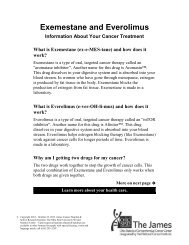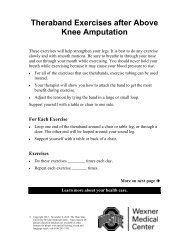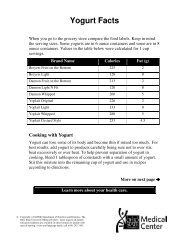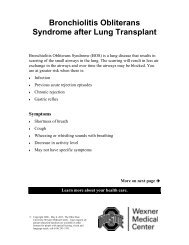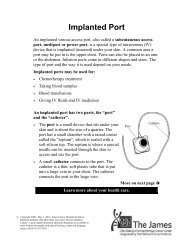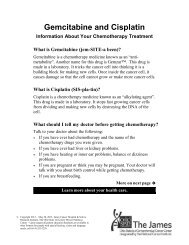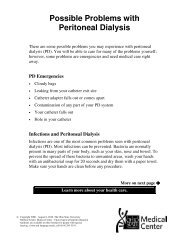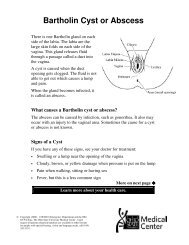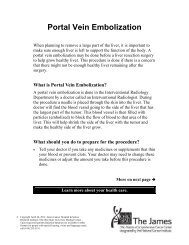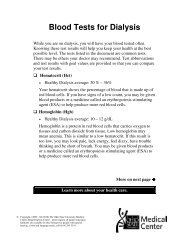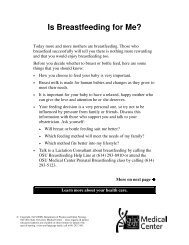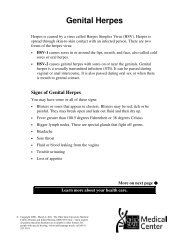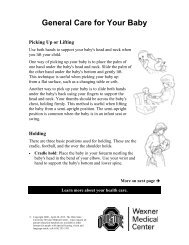Injectable Insulin During Pregnancy - Patient Education Home
Injectable Insulin During Pregnancy - Patient Education Home
Injectable Insulin During Pregnancy - Patient Education Home
Create successful ePaper yourself
Turn your PDF publications into a flip-book with our unique Google optimized e-Paper software.
<strong>Injectable</strong> <strong>Insulin</strong> <strong>During</strong><br />
<strong>Pregnancy</strong><br />
What is insulin?<br />
<strong>Insulin</strong> is a hormone made by the pancreas. The pancreas is a small<br />
organ that lies behind and below the stomach. <strong>Insulin</strong> allows the food<br />
you eat to go into the body's cells for energy. A person cannot live<br />
without insulin.<br />
Why do I need to take insulin?<br />
You need to take insulin because your body:<br />
Does not make enough of its own insulin,<br />
Does not make any insulin,<br />
or<br />
Cannot use the insulin it does make.<br />
Why can't I take an insulin pill to control my diabetes?<br />
<strong>Insulin</strong> cannot be taken in the form of a pill. The stomach juices would<br />
destroy it before the body could use it. <strong>Insulin</strong> is most often taken as a<br />
shot using a syringe, pen injector or insulin pump.<br />
© Copyright, (2001 - 5/5/2011) The Ohio State University Medical<br />
Center, Division of Endocrinology - Upon request all patient<br />
education handouts are available in other formats for people with<br />
special hearing, vision and language needs, call (614) 293-3191.<br />
Learn more about your health care.<br />
More on next page
Page 2<br />
How long will I have to take insulin?<br />
Some people only need insulin for a short time. This is often due to<br />
stress during pregnancy or illness, infection, surgery or when taking<br />
certain medicines such as steroids.<br />
With Type 2 diabetes you may or may not need insulin to control your<br />
blood sugar or glucose. This is because your body still makes some<br />
insulin. You may or may not take oral medication to work with the<br />
insulin.<br />
With Type 1 diabetes, you will need insulin for the rest of your life. This<br />
is because your body does not make any insulin. You will probably need<br />
two or more shots of insulin each day. Your doctor will decide how<br />
many shots and how much insulin you will need to take.<br />
Where does insulin come from?<br />
In the United States the most common type of insulin is human insulin.<br />
These are made from harmless bacteria through DNA engineering.<br />
What supplies will I need to take my insulin?<br />
You will need:<br />
• <strong>Insulin</strong> vial, pen or cartridge<br />
• Syringes or pen needles<br />
• Alcohol swabs<br />
Keep at least a week's supply of insulin<br />
and syringes on hand.<br />
What time should I take my insulin?<br />
It is best to take your insulin at the same time(s) every day. Do not vary<br />
the time of your injection by more than one hour. If you are taking short<br />
acting insulin, such as Regular, take your insulin 30 to 45 minutes before<br />
eating. If you take quick acting insulin, such as Humalog or Novolog,<br />
take your insulin within 15 minutes of eating.
Where should I give my insulin?<br />
The preferred site for insulin injections during pregnancy<br />
is the abdomen. Using this site will not harm the baby<br />
because the needle will not reach the uterus even in late<br />
gestation.<br />
Do not give your shot in the same spot. Move from one<br />
side of the abdomen to the other or stay at least an inch<br />
from the last injection site. Always give your insulin<br />
straight into the skin at a 90-degree angle.<br />
<strong>Insulin</strong> is absorbed differently throughout your body.<br />
Fastest absorption is your abdomen followed by the arm,<br />
then the upper leg.<br />
What do I need to know about my insulin?<br />
Page 3<br />
Check the label(s) on your insulin bottle(s) to be sure you have the right<br />
kind. You need to know the following about your insulin:<br />
• Name - such as NPH, Regular, Humalog, Novolog, Lantus<br />
• Strength - U-100 is used in the United States.<br />
• Brand - such as Novo-Nordisk, Eli-Lilly or Aventis<br />
• Expiration date - Do not use expired insulin.<br />
• When traveling, keep your syringes and insulin with you in case your<br />
luggage is lost. Do not store it in the trunk or glove compartment of<br />
your car.<br />
• Keep your insulin in the refrigerator. Extra bottles should also be kept<br />
in the refrigerator. Most insulin is only good for one month at room<br />
temperature, except for Levemir that lasts for 42 days. Avoid<br />
exposing insulin to extreme temperatures and direct sunlight. <strong>Insulin</strong><br />
pens and cartridges at room temperature are good for 14 days (NPH);<br />
28 days (Regular, Humalog, Novolog, Apidra and Lantus); 42 days<br />
(Levemir).<br />
• Your doctor will choose the kind and amount of insulin you need.
Page 4<br />
Quick Acting<br />
• Apidra<br />
Do not change the name, strength, species or brand of your insulin. Only<br />
your doctor should make these changes.<br />
How does insulin work?<br />
There are five kinds of injectable insulin:<br />
• Quick acting - Humalog (Lispro), Novolog (Aspart) and<br />
Apidra<br />
• Short acting - Regular<br />
• Intermediate<br />
acting<br />
- NPH<br />
• Basal acting - Lantus and Levemir (these cannot be mixed in a<br />
syringe with other insulins)<br />
• Pre-mixed* -<br />
Novolin 70/30 or Humulin 70/30 = 70% NPH<br />
and 30% Regular<br />
Humalog Mix 75/25 = 75% NPL and 25%<br />
Humalog<br />
Novolog Mix 70/30 = 70% NPH and 30%<br />
Novolog<br />
*Note: Pre-mixed insulins are not recommended during pregnancy.<br />
This table shows when the insulins start to work, when they work the<br />
hardest (peak) and when they are gone from the body.<br />
• Humalog (Lispro)<br />
• Novolog (Aspart)<br />
Type Starts Works Hardest<br />
(Peak)<br />
20 minutes<br />
5 - 10 minutes<br />
5 - 10 minutes<br />
34 - 90 minutes<br />
1 - 2 hours<br />
1 - 2 hours<br />
Duration<br />
3.5 hours<br />
3.5 hours<br />
3.5 hours
Short Acting<br />
• Regular<br />
Intermediate Acting<br />
• NPH<br />
Basal<br />
Type Starts Works Hardest<br />
(Peak)<br />
(Cannot be mixed with other insulins)<br />
• Lantus<br />
• Levemir<br />
30 minutes<br />
1 - 2 hours<br />
immediately<br />
immediately<br />
2 - 4 hours<br />
6 - 10 hours<br />
None<br />
None<br />
What problems might happen with giving insulin shots?<br />
Most people have no trouble giving their insulin injections. Talk with<br />
your nurse or doctor if you have any of the following problems:<br />
• Bruising<br />
• Dimpled areas<br />
• Redness<br />
• Hard, lumpy areas<br />
• Itching<br />
Can I reuse my insulin syringes?<br />
Page 5<br />
You may be able to reuse your syringes. If they can be reused, your<br />
nurse can show you how to safely do this. Because some people should<br />
not reuse their syringes, it is important for you to discuss this with your<br />
doctor or nurse.<br />
Can I reuse my pen needles?<br />
Because your pen needle must be removed to close the pen after<br />
injecting insulin, you cannot reuse them.<br />
Duration<br />
6 - 8 hours<br />
16 - 24 hours<br />
up to 24 hours<br />
up to 24 hours
Page 6<br />
What else can I do to control my diabetes?<br />
Besides taking your insulin, there are several things you can do to help<br />
control your diabetes. These include:<br />
• Check and record your blood glucose (sugar) levels daily. If you<br />
notice patterns of low or high glucoses, call your doctor. (For more<br />
information, refer to the handouts on glucose monitoring, low blood<br />
sugar and high blood sugar.)<br />
• Follow your diet / meal plan<br />
• Exercise regularly<br />
• Keep your doctors' appointments<br />
Talk to your doctor or others on your health care team if you<br />
have questions. You may request more written information from<br />
the Library for Health Information at (614) 293-3707 or email:<br />
health-info@osu.edu.



